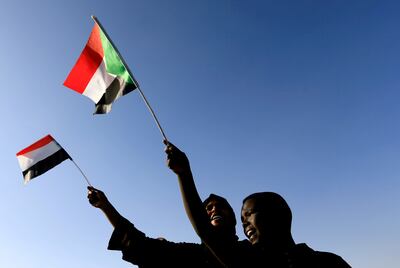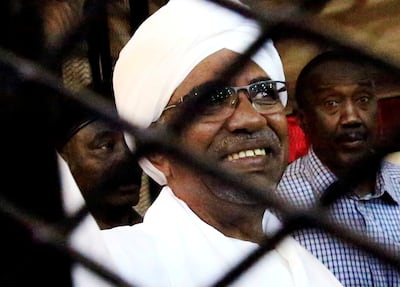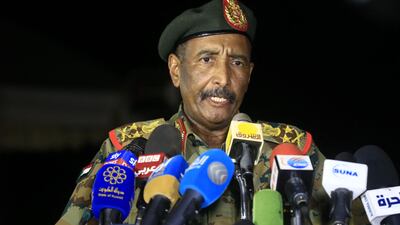Sudanese troops guarding the property of ousted dictator Omar Al Bashir withdrew on Sunday, a sign the fissure between the army and the politicians ruling the country has grown since the attempted coup last week.
The 18-member Committee to Dismantle the Regime and Retrieve Public Funds was set up after Al Bashir’s downfall to retrieve hundreds of millions of dollars in land, property and companies in the capital, Khartoum.
Composed of military leaders and civilians, it urged those who took part in the 2019 uprising to move in to protect them.
“In a strange move, the troops which are assigned to guard the assets and buildings seized from the ousted regime have received orders to withdraw and evacuate them immediately,” it said in a statement shared with The National.
Al Bashir stayed in power for 30 years before the military forced him out after a popular uprising. He is in jail in the Sudanese capital and faces charges of treason, corruption and war crimes, all of which he denies.
Sudan’s foreign minister has said the country’s Cabinet is divided on how to hand him to the International Criminal Court.
Al Bashir was convicted of corruption and faces several other charges in Sudan.
He is also wanted by the ICC, for genocide, war crimes and crimes against humanity committed during the conflict in Darfur.
More than 300,000 people were killed and millions displaced by the fighting.

Fractious relationship
Tension among the members of the Sovereign Council has risen sharply since this month’s failed coup, which was blamed on Al Bashir loyalists in the military.
Both sides have traded barbs publicly and blamed each other for their country’s difficulties.
“Some senior officers are upset with accusations by civilian politicians that the military wants to stay in power and is working against the revolution. They didn’t attend two closed meetings yesterday and the day before in protest,” General Amin Ismail Madgzoub, a senior crisis solution advisor to the armed forces, told The National.
On Sunday, the head of the Sovereign Council, Lt Gen Abdel Fattah Al Burhan, said the army would always protect the December revolution.
“The armed forces are the guardians of Sudan, its security and its people. The revolutionary forces should act in unison and never allow a small group to hijack the revolution,” he said at the opening of a hospital in Khartoum. “We are going to reorganise the armed forces ... Partisan activities are banned in the army.”
He emphasised that the armed forces were committed to holding elections on the date fixed for ending the transition in 2023.
“After that, the army will leave the political scene and its role will be limited to protecting the country.”

Two days after the military announced they had arrested 21 mutinous officers and soldiers, army leaders accused the civilians they share power with of seeking personal gains and forgetting the aims of the revolution.
Gen Mohamed Dagalo, a paramilitary leader and Al Burhan’s deputy in the Sovereign Council, said politicians were the main cause of coups.
Civilian politicians argued that such comments are a threat to the transition to democracy, with Sudan having experienced 11 coups and failed attempts since it became an independent state in 1956.
But Mohamed Al Amin Abdel Nabi, the first media advisor to the Foreign Ministry, sought to play down the hostile tone between both sides.
“Army generals and civilian cabinet ministers are meeting as usual but there are tensions between both sides in the wake of the failed coup attempt,” he told The National.
“Today, a government delegation led by Lt Gen Shams El-Din Al Kabashi, and including the ministers of foreign affairs, oil and interior, headed to Port Sudan in the east to talk with representatives of the anti-government protesters,” he said. It was a reference to the turmoil in the Red Sea trade hub of Port Sudan, which is affecting fuel supplies and revenue.
In a statement late on Sunday civilian Prime Minister Abdalla Hamdok said the dispute "is not between the military and civilians, but between those who believe in the civilian democratic transition either military or civilian, and those who want to block the path from both sides."
The escalation in tension is on public display days before the visit of US envoy for the Horn of Africa, Jeffrey Feltman, to reaffirm American support for the country’s government.
In a phone call with Prime Minister Abdalla Hamdok on Friday, national security adviser Jake Sullivan “expressed the Biden administration’s commitment to support the civilian-led transition to democracy in Sudan and oppose any attempts to derail or disrupt the will of the Sudanese people”, the White House National Security Council said.


